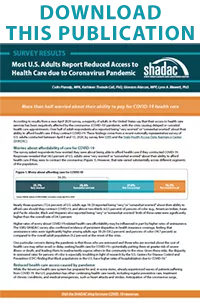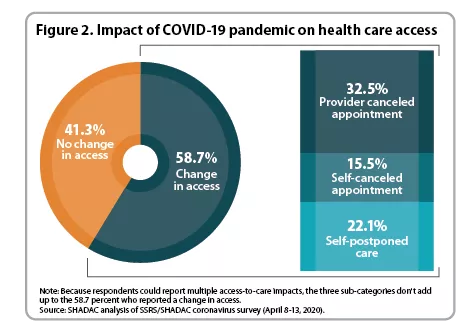More than half worried about their ability to pay for COVID-19 health care
Colin Planalp, MPA, Kathleen Thiede Call, PhD, Giovann Alarcon, MPP, Lynn A. Blewett, PhD
According to results from a new April 2020 survey, a majority of adults in the United States say that their access to health care services has been negatively affected by the coronavirus (COVID-19) pandemic, with the crisis causing delayed or canceled health care appointments. Over half of adult respondents also reported being “very worried” or “somewhat worried” about their ability to afford health care if they contract COVID-19. These findings come from a recent nationally representative survey of U.S. adults conducted between April 8 and 13, 2020, by survey firm SSRS and the State Health Access Data Assistance Center (SHADAC).
Worries about affordability of care for COVID-19
The survey asked respondents how worried they were about being able to afford health care if they contracted COVID-19. Responses revealed that 54.5 percent of U.S. adults were “very worried” or “somewhat worried” about their ability to afford health care if they were to contract the coronavirus (Figure 1). However, that rate varied substantially across different segments of the population.
Nearly three-quarters (72.6 percent) of U.S. adults age 18-29 reported being “very” or “somewhat worried” about their ability to afford care should they contract COVID-19, and almost two-thirds (63.5 percent) of persons of color (e.g., American Indian, Asian and Pacific Islander, Black and Hispanic) also reported being “very” or “somewhat worried.” Both of those rates were significantly higher than the overall rate of 54.5 percent.
Higher rates of worry about COVID-19-related health care affordability may be influenced in part by higher rates of uninsurance. The SSRS/SHADAC survey also confirmed evidence of persistent disparities in health insurance coverage, finding that uninsurance rates were significantly higher among adults age 18-29 (18.2 percent) and persons of color (14.7 percent) as compared to the overall adult population (9.2 percent) at the onset of the crisis.
One particular concern during the pandemic is that those who are uninsured and those who are worried about the cost of health care may either avoid or delay seeking health care for COVID-19—potentially putting them at greater risk of severe illness or death, and leading them to inadvertently expose others in the community to the virus. Given these risks, the disparity in uninsured rates for persons of color is especially troubling in light of research by the U.S. Centers for Disease Control and Prevention (CDC) finding that Black populations in the U.S. have higher rates of hospitalization due to COVID-19.1
Reduced health care access caused by pandemic
While the American health care system has prepared for and, in some states, already experienced waves of patients suffering from COVID-19, the U.S. population has other continuing health care needs, including regular preventive care, treatment of chronic conditions, and medical emergencies, such as heart attacks and strokes.
Anticipation of the coronavirus surge, however, has caused some health care providers to cancel appointments for conditions other than COVID-19, and it has driven some individuals to cancel or delay care due to concerns of exposure to the virus.
The survey found that 58.7 percent of U.S. adults reported the pandemic hindering their access to health care services, by way of either personal decisions to postpone making an appointment or canceling or postponing existing appointments, or having an appointment canceled by a health care provider (Figure 2). Almost one-third (32.5 percent) said they had a medical or dental appointment canceled by their provider due to the pandemic. Roughly one-fifth (22.1 percent) said they postponed scheduling a health care appointment due to concerns about exposure to the coronavirus, and 15.5 percent said they canceled an already scheduled appointment due to exposure concerns, as well.
Crisis caused loss of health insurance
In addition to the 9.2 percent of U.S. adults who were uninsured at the onset of the COVID-19 crisis, another 2.6 percent reported losing health insurance coverage since the pandemic began, either because they lost health insurance through an employer or they canceled their coverage to pay for other expenses.
That rate of 2.6 percent equates to roughly 6.5 million U.S. adults who reported losing their health insurance since the pandemic began. However, there are several factors that demonstrate that those figures are an underestimate of the number of people who have lost health insurance. First, this survey was conducted between April 8 and 13, 2020, but millions more Americans have filed new weekly unemployment claims since the survey ended, and it’s likely that many of those individuals also lost their employer-based insurance coverage when they became unemployed.2
Second, the rates from the survey are only based on the respondent’s own insurance status, not on whether other family members or dependents, such as spouses and children, also lost coverage. Another recent study by the University of Minnesota, including researchers from SHADAC, found that as many as 18.4 million Americans may be at risk of losing employer-sponsored insurance due to the coronavirus crisis.3 If uninsured rates continue to climb during the crisis, it is possible that worries about affording care for COVID-19 and impacts on health care access may become even more prevalent.
More on the survey
The Coronavirus Poll was funded and conducted by SSRS. SSRS is a public opinion and survey research company based in Media PA. Data collection was conducted using SSRS Opinion Panel, a nationally representative probability-based web panel (https://ssrs.com/opinion-panel/). Surveys were conducted online from April 8-13, 2020, among a nationally representative sample of 1,001 respondents age 18 and older. The margin of error for total respondents is +/-4.4 percentage points at the 95% confidence level.
Acknowledgment: We appreciate contributions to the survey by Sarah Hagge and Alisha Baines Simon of the Health Economics Program at the Minnesota Department of Health.
1 Garg, S., Kim, L., Whitaker, M., O’Halloran, A., Cummings, C., Holstein, R, et al. (2020, April 17). Hospitalization rates and characteristics of patients hospitalized with laboratory-confirmed coronavirus disease 2019—COVID-Net, 14 states, March 1-30, 2020. MMWR Weekly, 69(15), 458-464. DOI: http://dx.doi.org/10.15585/mmwr.mm6915e3
2 U.S. Department of Labor. (2020, April 23). COVID-19 Impact: The COVID-19 virus continues to impact the number of initial claims and insured unemployment. Retrieved from https://www.dol.gov/sites/dolgov/files/OPA/newsreleases/ui-claims/20200691.pdf
3 Golberstein, E., Abraham, J.M., Blewett, L.A., Fried, B., Hest, R., & Lukanen, E. (2020). Estimates of the impact of COVID-19 on disruptions and potential loss of employer-sponsored health insurance (ESI). Retrieved from https://shadac-pdf-files.s3.us-east-2.amazonaws.com/s3fs-public/publications/UMN%20COVID-19%20ESI%20loss%20Brief_April%202020.pdf



